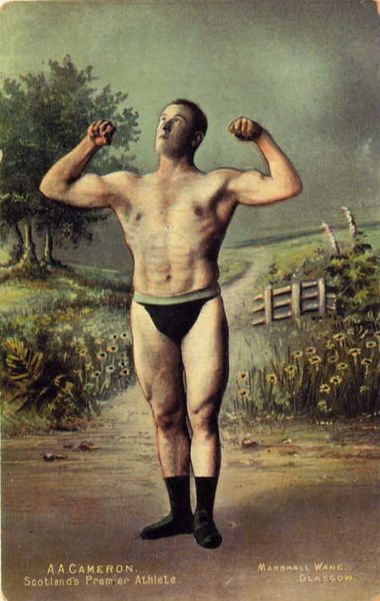Annotation:Sandy Cameron's (Strathspey): Difference between revisions
No edit summary |
No edit summary |
||
| Line 10: | Line 10: | ||
<div style="text-align: justify; direction: ltr; margin-bottom: 90px; margin-left: 70px; margin-right: 120px;"> | <div style="text-align: justify; direction: ltr; margin-bottom: 90px; margin-left: 70px; margin-right: 120px;"> | ||
<br> | <br> | ||
'''SANDY CAMERON’S.''' Scottish, Canadian; Strathspey (whole time). Canada, Cape Breton. A Major/Mixolydian. Standard tuning (fiddle). AAB. Scottish fiddle great [[biography:J. Scott Skinner]] (1843-1927) composed this pipe strathspey for Sandy Cameron, “The Famous Athlete,” who was a younger friend. [[File:sandycameron.jpg| | '''SANDY CAMERON’S.''' Scottish, Canadian; Strathspey (whole time). Canada, Cape Breton. A Major/Mixolydian. Standard tuning (fiddle). AAB. Scottish fiddle great [[biography:J. Scott Skinner]] (1843-1927) composed this pipe strathspey for Sandy Cameron, “The Famous Athlete,” who was a younger friend. [[File:sandycameron.jpg|380px|thumb|right|A.A. Cameron]] Alexander Anthony (“A.A.” or “Sandy”) Cameron (1875-1951), The Mighty Mucomir, was a native of Dochanassie, Lochaber, Inverness-shire, near Fort William. His first love was farming (his nickname "Mighty Mucomir" stems from the Highland custom of naming a person from the property he owns), but he had a large frame, handsome physique and prodigious strength, and he soon gained fame at fairs, Highland games and other competitions where his feats of agility and strength were unparalleled prior to World War I. Cameron was enticed to tour several times, venturing as far as Australia, New Zealand, America and Russia, where he performed feats of strength on stage. In his prime he held 16 records, some still unbeaten at the time of his death at age 76, some thirty years after he had stopped competing. | ||
<br> | <br> | ||
<br> | <br> | ||
Revision as of 19:02, 20 July 2018
X: 1 T: Sandy Cameron T: (The Famous Athlete) C: J. Scott Skinner R: strathspey Z: 2009 John Chambers <jc:trillian.mit.edu> F: http://www.abdn.ac.uk/scottskinner/display.php?ID=JSS0711 N: First of two variants, by J.S.Skinner P: Pipe Strathspey M: C L: 1/16 K: A {g}a2 \ | "A"AAA2 (c3A) (e3A) (c3A) | "Bm"BBB2 (d3B) (f3B) (d3B)| "A"AAA2 (c3A) ({g}a3A) (c3A)| "D"ddd2 "E7"(B3e) "A"{cd}[c3E3][AE] [A2E2] :|g2 \ | "A"(3a2g2f2 (3e2f2g2 a3e c2A | "G"(3=g2f2e2 (3d2e2f2 g3d B3=G| "A"(3a2^g2f2 (3e2f2g2 a3e c2A | "D"ddd2 "E7"(B3e) "A"({cd}c3A) (A3[ge]) || "A"(3a2g2f2 (3e2f2g2 a3e c2A | "G"(3=g2f2e2 (3d2e2f2 g3d B3=G | "A"c3{B}A "Bm"d3{c}B "A/C#"e3{d}c "A"a3c | "D"ddd2 "E7"(B3e) "A"{cd}[c3E3][AE] [A2E2] |]

Skinner recorded the strathspey on 78 RPM towards the end of his life, in the 1920’s, and published (by Bayley & Ferguson on a single sheet [1]) both pipe and fiddle settings; subsequently it has entered both piping and fiddling repertory. Paul Stewart Cranford (2000) points out the Cape Breton versions tend to employ the ‘G’ natural and more cuts than do Scottish ones. The strathspey has sometimes been associated with composer Alex Cameron (1848-1923), who came from a famous Scottish piping family.
